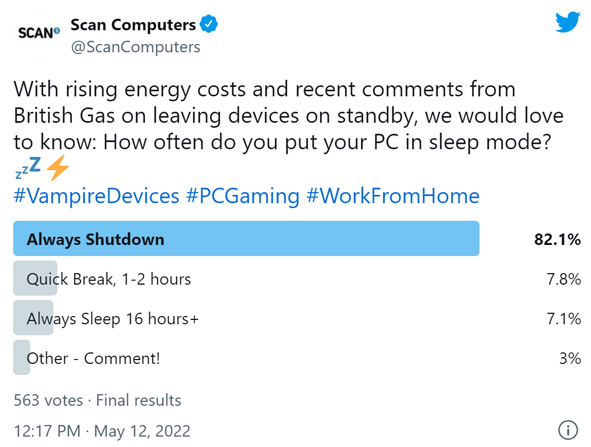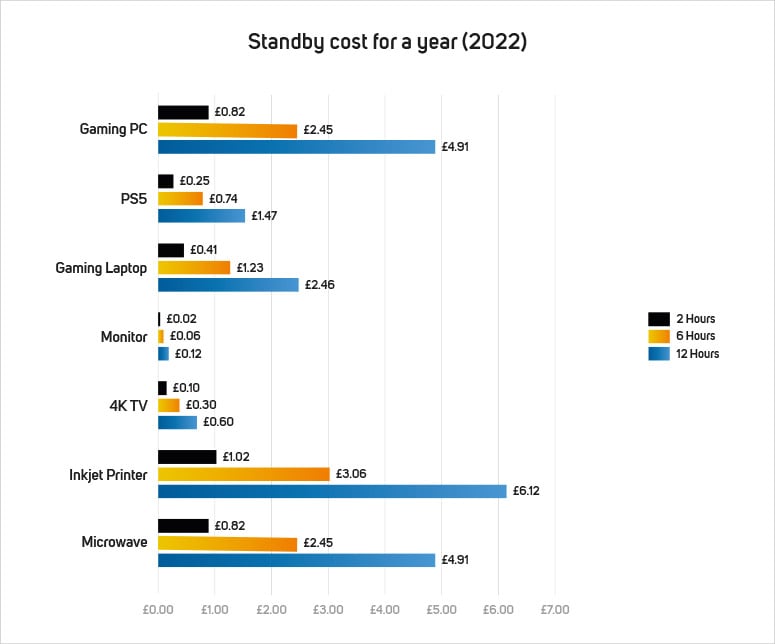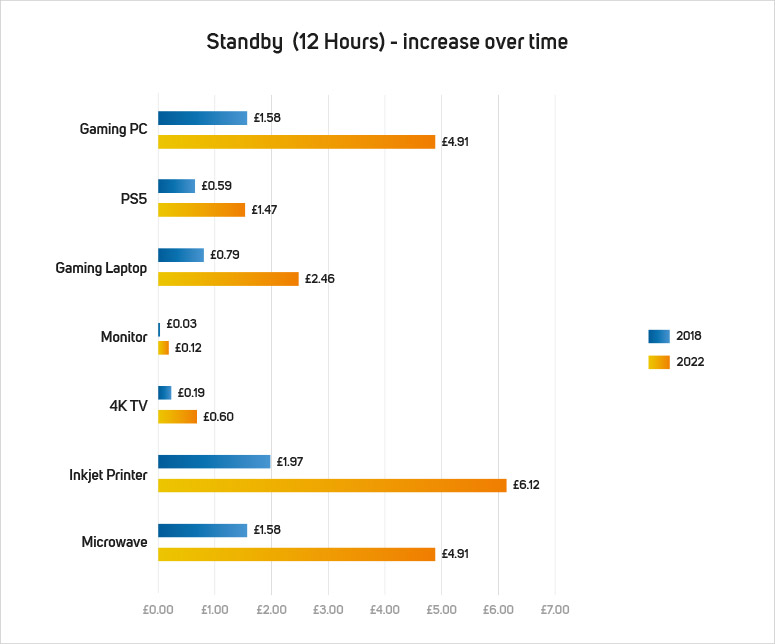The ‘Vampire Devices’ - How much does it cost to run a gaming PC?
As energy prices soar, the big fuel companies are yet again passing the buck onto the consumer, and of course it’s gaming that gets the blame for yet another societal problem.
As reported by BBC news, British Gas claims that so-called ‘vampire devices’ are one of the causes for high energy bills, and have advised that turning gaming devices off rather than leaving them on standby will save you a noticeable amount of money per year.
According to the BBC “as long as devices are plugged in at the wall, they are slowly drawing power. It may be convenient to leave the television on standby and wake it up with a press of a button on a remote, but this can be expensive. British Gas used average costs of wattage from different manufacturers' average models when left on standby to calculate its figures. It says a TV clocks up £24.61 per year, while a set-top box from Sky or Virgin Media can incur £23.10. British Gas says games consoles left on standby work out at an average of £12.17, while computers could cost about £11.22.
And there's more:
• Microwave: £16.37
• Shower: £9.80
• Washing machine: £4.73
• Printer: £3.81
• Phone charger: £1.26
It says its figures are in line with figures from the Energy Saving Trust in terms of the percentage of electricity used by ‘vampire devices’.“
It’s quite apparent that these figures just do not seem right. At Scan, our gaming PCs are power efficient, and TVs and games consoles have to adhere to power consumption regulations.
Let’s dive into the facts using https://www.sust-it.net/energy-calculator.php
How much does it cost to run a gaming PC?
Let’s take a look at a typical high end gaming PC we sell.
With a Core i9 CPU, RTX 3080 graphics, 32GB of RAM and watercooling this PC is certainly a beast and so has an 750W power supply.

According to a 2019 study by Limelight, hardcore gamers spend 11.5 hours on average a week gaming of all ages, and gamers at the age of 26-35 spend 8 hours a week on average playing games.
Based on this data, if you were to game 8 hours a week, you’d be gaming for 416 hours a year. That would be up to £87 of electricity a year.
Many of our Gaming PCs use less power than 750W. For example this gaming computer uses a 550W power supply. This would cost you up to £59 a year.
For these two examples, we’ve assumed that the PCs are drawing the maximum amount of power continuously, but this isn’t always the case. Read our power supply buyers guide to find out how PC PSUs work.
How much does it cost to run a gaming laptop?
It gets even less when we talk about gaming laptops. A typical high-end gaming laptop draws around 250W when gaming, which equates to £29 a year.
How much does it cost to leave a PC on standby?
Specifically though, British Gas claimed that you can make savings of up to £11.22 by switching off your computer instead of putting it to sleep.
So how much power does a gaming PC use on standby?
The home hacks DIY says that putting a PC on standby uses between 3 to 10W, and when we tested the aforementioned high end gaming PC in our 3XS lab it consumed 4W in standby. Using our example of 8 hours of gaming a week, as a worst-case scenario if you leave your PC on standby the rest of the time this comes to £9.68 a year, not far off what British Gas is claiming, although in absolute terms not a huge amount really compared to the cost of the hardware. A more realistic scenario however is only putting your PC into sleep mode a couple of hours a day in between games and switching it off the rest of the time, which would only cost you £0.82 a year.

How much does it cost to run a PS5?
Gaming on a Playstation 5 uses 200W which works out to be £0.05 an hour. Going by our average of 8 hours gaming a week, your PS5 is going to cost you £23 a year to run.
Leaving a PS5 on standby uses 0.35W by default and 1.2W when on standby while still being connected to the Internet.
This means that as a worst-case scenario, leaving your PS5 on standby on the rest of the time, would cost you £0.85 a year or £2.90 a year connected to the Internet. Both of these figures are a long way off the ludicrous £12.17 British Gas is claiming. And of course, if you switched your PS5 off in between gaming sessions the running costs would come down even more.
So how does this compare to other appliances in the house?
As a point of comparison, an 8.5kW electric shower, consumes 10x more power than our high end gaming PC and 42.5x more power than a PS5 and will cost you £144 a year on electricity based on a daily shower of 10 minutes on average.
How much does it cost to leave other things on standby?
An LG 4K TV uses up to 0.5W in standby mode, so assuming you watch 3 hours of TV every day, and it’s on standby the other 21 hours this would cost you £1.07 a year. Well off the £24 British Gas is claiming.
A typical laptop in standby uses 2W, so as a worst-case scenario, using mains power in sleep mode would cost you £4.84 a year and far less if using the battery or shorter periods of standby.
Our final example is a computer monitor, which typically use 0.1W in standby, so is going to cost you just £0.24 a year.
| Standby cost for a year (2022) | ||||
|---|---|---|---|---|
| Device | Standby Power | 12 Hours | 6 Hours | 2 Hours |
| Gaming PC | 4W | £4.91 | £2.45 | £0.82 |
| PS5 | 1.2W | £1.47 | £0.74 | £0.25 |
| Gaming Laptop | 2W | £2.46 | £1.23 | £0.41 |
| 4K TV | 0.5W | £0.60 | £0.30 | £0.10 |
| Monitor | 0.1W | £0.12 | £0.06 | £0.02 |
| Microwave | 4W | £4.91 | £2.45 | £0.82 |
| Inkjet Printer | 5W | £6.12 | £3.06 | £1.02 |

This graph shows how much it costs to leave each device in standby for between 2 and 12 hours per day for a year.

This graph shows the huge increase in cost compared to four years ago when leaving various devices in standby 12 hours a day.
Conclusion
The figures British Gas cited are very unrealistic as it has used the assumption that devices are left on standby all year round whenever not being used. However, our survey data shows that most PC gamers do switch off their PCs and only use standby a couple of hours a day.
Even if you did leave your device in standby for extended periods, our data clearly shows that the majority of devices we sell, such as gaming PC, do not consume a great amount of power in standby.
Many other devices’ yearly costs are nowhere near to what British Gas claims and if you’re a PS5 or laptop user, leaving it on standby does not make much of a difference.
We’re not saying British Gas is wrong as it may have used different devices and assumptions to ours, we just thought you’d be interested to see some alternate figures and see what the real running costs of gaming hardware is.